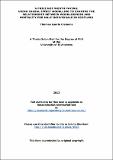A price not worth paying : using causal effect modelling to examine the relationship between worklessness and mortality for male individuals in Scotland
Abstract
The research conducted in this thesis examines the relationship between forms of
worklessness (both active unemployment and inactivity due to sickness and disability) and
mortality for working age men. Previous research has shown that being out of work is
associated with a greater risk of mortality relative to being in work. However, there remains
debate as to whether this association is the result of a causal pathway leading from
worklessness to mortality or whether it reflects the ‘selection’ of individuals who are already
at greater risk of mortality from pre-existing poor health or other characteristics. In the UK,
many studies rely on the use of ‘wear-off’ periods in which mortality events occurring within
five years after the observation of employment status are ignored to allow the confounding
effects of selection to diminish. Generally these studies concluded in support of a causal
relationship. In contrast, more recent studies making use of innovative methodological
designs such as natural experiments and linked register and health datasets have found less
evidence for this explanation with many emphasising the role of confounding and selection.
The thesis aims to firstly, examine the effectiveness of wear-off periods and secondly, to
develop an alternative counterfactual approach to examine the relationship between
worklessness (both active unemployment and health related inactivity) and mortality. These
questions are addressed in three stand-alone papers.
In the first paper, data from the Scottish Longitudinal Study and the England & Wales
Longitudinal Study was used in logistic regression models which estimated the odds of death
in a given time period after the 1991 Census for those aged 35–64 in 1991. The odds ratios
for the different economic positions (in work, unemployed, retired, permanently sick and
other inactive) were compared, as well as the changes in risk associated with cumulatively
increasing the length of wear-off prior to follow-up. No evidence was found of health related
selection for the unemployed in 1991 suggesting that the use of the five year wear-off period
in many studies of mortality and unemployment may be an ineffective and unnecessary
technique for mitigating the effects of health-related selection.
The second paper examined men aged between 35 and 54 who were in work in 1991.
Subsequent employment status in 2001 was observed (in work or unemployed) and the
relative all-cause mortality risk of unemployment between 2001 and 2007 was estimated. To
account for potential selection into unemployment of those in poor health, a counterfactual
propensity score matching framework was used to construct unbiased and comparable samples of in work and unemployed individuals. Matching was based on a wide range of
explanatory variables including health status prior to year of unemployment (hospital
admissions and self-reported limiting long term illness) as well as measures of socio-economic position. The findings showed that unemployment was associated with a doubling
(hazard ratio 2.1 95% CI 1.30 - 3.38) of the subsequent risk of mortality from all causes
relative to employment. This scale of effect was consistent across different samples and was
robust controlling for prior health and socio-demographic characteristics. These findings
were interpreted as evidence that the often observed association between unemployment and
mortality may contain a causal component.
The second paper implemented a similar analytical design to address the lack of evidence for
the independent mortality effect of inactivity due to sickness. The results showed that the
mortality risk of economic inactivity due to sickness relative to active employment was
significant (HR. 3.18, 95% CI 2.53-3.98) and suggest that economic inactivity due to
sickness poses a mortality risk that is independent of prior health. The findings could be
interpreted in two ways; either economic inactivity due to sickness is worse for health than
actively seeking work or previous studies of unemployment and mortality have
underestimated the true effect of being out of work generally.
Across the three studies, the main contribution of the thesis is to reassert the importance of
worklessness as a determinant of individual mortality. In doing so the studies also found
little evidence of systematic confounding by either health or other characteristics. The thesis
concludes with a comprehensive discussion of the wider implications of the findings in
relation to both general methodological issues in observational epidemiology and possible
policy interventions that could be implemented to tackle work-related inequalities in male
mortality.
Type
Thesis, PhD Doctor of Philosophy
Collections
Items in the St Andrews Research Repository are protected by copyright, with all rights reserved, unless otherwise indicated.

